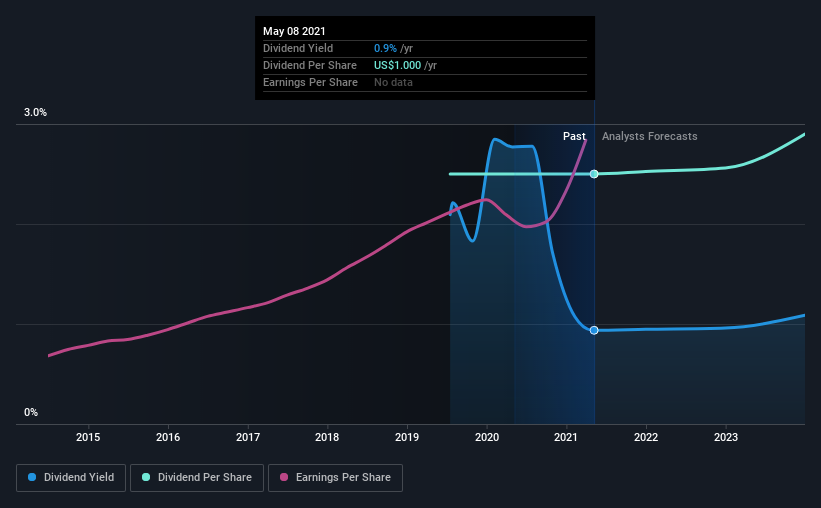Why You Might Be Interested In Western Alliance Bancorporation (NYSE:WAL) For Its Upcoming Dividend
Some investors rely on dividends for growing their wealth, and if you're one of those dividend sleuths, you might be intrigued to know that Western Alliance Bancorporation (NYSE:WAL) is about to go ex-dividend in just three days. This means that investors who purchase shares on or after the 13th of May will not receive the dividend, which will be paid on the 28th of May.
Western Alliance Bancorporation's next dividend payment will be US$0.25 per share. Last year, in total, the company distributed US$1.00 to shareholders. Last year's total dividend payments show that Western Alliance Bancorporation has a trailing yield of 0.9% on the current share price of $106.7. Dividends are an important source of income to many shareholders, but the health of the business is crucial to maintaining those dividends. As a result, readers should always check whether Western Alliance Bancorporation has been able to grow its dividends, or if the dividend might be cut.
See our latest analysis for Western Alliance Bancorporation
If a company pays out more in dividends than it earned, then the dividend might become unsustainable - hardly an ideal situation. Western Alliance Bancorporation has a low and conservative payout ratio of just 16% of its income after tax.
Generally speaking, the lower a company's payout ratios, the more resilient its dividend usually is.
Click here to see the company's payout ratio, plus analyst estimates of its future dividends.
Have Earnings And Dividends Been Growing?
Companies with consistently growing earnings per share generally make the best dividend stocks, as they usually find it easier to grow dividends per share. If earnings decline and the company is forced to cut its dividend, investors could watch the value of their investment go up in smoke. It's encouraging to see Western Alliance Bancorporation has grown its earnings rapidly, up 25% a year for the past five years.
The main way most investors will assess a company's dividend prospects is by checking the historical rate of dividend growth. Western Alliance Bancorporation's dividend payments are effectively flat on where they were two years ago.
The Bottom Line
Should investors buy Western Alliance Bancorporation for the upcoming dividend? Typically, companies that are growing rapidly and paying out a low fraction of earnings are keeping the profits for reinvestment in the business. This is one of the most attractive investment combinations under this analysis, as it can create substantial value for investors over the long run. Western Alliance Bancorporation ticks a lot of boxes for us from a dividend perspective, and we think these characteristics should mark the company as deserving of further attention.
On that note, you'll want to research what risks Western Alliance Bancorporation is facing. For example - Western Alliance Bancorporation has 3 warning signs we think you should be aware of.
We wouldn't recommend just buying the first dividend stock you see, though. Here's a list of interesting dividend stocks with a greater than 2% yield and an upcoming dividend.
This article by Simply Wall St is general in nature. It does not constitute a recommendation to buy or sell any stock, and does not take account of your objectives, or your financial situation. We aim to bring you long-term focused analysis driven by fundamental data. Note that our analysis may not factor in the latest price-sensitive company announcements or qualitative material. Simply Wall St has no position in any stocks mentioned.
Have feedback on this article? Concerned about the content? Get in touch with us directly. Alternatively, email editorial-team (at) simplywallst.com.

 Yahoo Finance
Yahoo Finance 
